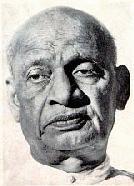|
Patel was 'a great captain of our forces in the struggle
for freedom,
a tower of strength to wavering hearts'
 Fifty years after India won freedom, the myth that Sardar Patel
was anti-Muslim persists. In this fascinating essay, Dr Rafiq Zakaria,
the respected scholar, reveals the truth about Patel
and India's Muslims.
Fifty years after India won freedom, the myth that Sardar Patel
was anti-Muslim persists. In this fascinating essay, Dr Rafiq Zakaria,
the respected scholar, reveals the truth about Patel
and India's Muslims.
Patel replied to Nehru the next day, in fact three days before
Tandon did, with his letter dated August 9, 1950 and suggested
that Nehru should try to bring round Tandon, who had the deepest
affection for him, and discuss personally 'his faults with
him,' adding, 'some might even find it strange that
matters have come to a head only at the time of his candidature,
when the malady was deep-seated.'
More letters were exchanged
between Patel and Nehru and when Patel learnt that in the contest
for the Congress presidentship, which by then had become inevitable,
Nehru was favouring Acharya Kripalani against Tandon, Patel was
amazed. Kripalani was much more anti-Muslim than Tandon. In his
last letter to Nehru on this controversy dated August 27, 1950,
Patel wrote, 'I regard Kripalani as having taken in the past,
with reference to the points you hold against Tandonji, a more
destructive and critical role against you than Tandonji has ever
done.'
In this unfortunate episode, what was surprising was that while
Rafi Ahmad Kidwai and Mridula Sarabhai were actively influencing
Nehru, Azad and Rajaji, whose secular credentials were impeccable,
were siding with Patel. In the election Tandon won; Nehru took
Kripalani's defeat so much to heart that he offered to resign
from the prime ministership. But the storm blew over.
Patel prevailed
upon Rajaji and Azad to bring about a reconciliation between Nehru
and Tandon. In the annual session at Nasik, over which Tandon
presided, Patel took care to see that every resolution, including
the one on the communal question, as drafted by Nehru, was passed
unanimously; he also helped to cool much of the heat generated
during the contest.
Nevertheless some close friends suggested
to Patel that he should let Nehru quit, and take over the prime
ministership. They assured him that the party was solidly behind
him. Patel had a hearty laugh. He told them, "you are right.
The party is with me; but the people are with him."
Soon thereafter, the Sardar passed away in Bombay on December
15, 1950. In a moving tribute in the Lok Sabha Nehru recalled
their long association and described Patel as "a friend and
a colleague on whom one could invariably rely." He was, to
use Nehru's picturesque words,''a great captain of our forces
in the struggle for freedom as well as in moments of victory..
a tower of strength to wavering hearts."
Azad was no less
eloquent in his praise of a life-long comrade, with whom he might
have had his differences, but whose valour was ''as high as the
mountains" and whose determination was ";as strong as
steel."
The final verdict on the attitude of the Sardar to Indian Muslims
was pronounced by Gandhiji, who was a better judge of it than
any of us. "He lived and worked to remove the divide between Hindus
and Muslims. He gave his life for it," he declared, "I know
the Sardar ... His method and manner of approach to the Hindu-Muslim
question, as also to several other questions, is different from
mine and Pandit Nehru's but it is a travesty of truth to describe
it as anti-Muslim. The Sardar's heart is expansive enough to accommodate
all."
Excerpted from Sardar Patel and Indian Muslims, by Rafiq Zakaria, Bharatiya Vidya Bhavan, 1996, Rs 125, with the author's permission. Readers interested in buying a copy of the
book may write to Bharatiya Vidya Bhavan, Kulapati K M Munshi Marg, Bombay 400 007.
|

